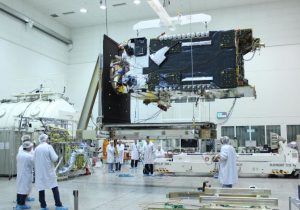
Israel’s Spacecom announced on February 27, 2017, that the AMOS-7 communications satellite is now providing a wide range of television and data communication services from its 4°W ‘hot-spot’ orbital position. Co-located with AMOS-3, AMOS-7 is replacing the AMOS-2 satellite that is reaching the end of life after servicing customers for over 13 years.
AMOS-7’s 24 Ku-band transponders and four steerable beams are providing a multi-regional experience covering Europe, Middle East and parts of Africa thereby offering services to Spacecom’s existing and new customers in Central and Eastern Europe, Africa and the Middle East.
According to Jacob Keret, Spacecom’s Senior Vice President Sales, “AMOS-7 creates a stronger presence at our 4°W orbital position. Adding further redundancy to our system, the satellite is a key element in expanding our multi-regional growth patterns and enhancing the array of communications – broadcast, broadband and data – that we can provide.”
Spacecom (Space-Communication Ltd.), operator of the AMOS-7 and AMOS-3 satellites co-located at 4°W, and AMOS-4 at 65°E, provides high-quality broadcast and communication services to Europe, the Middle East, Africa, and Asia via direct-to-home (DTH) and direct broadcast satellite (DBS) operators, Internet service providers (ISPs), telecom operators, network integrators and government agencies.
With the planned addition in 2019 of AMOS-17 at 17°E, Spacecom will further expand its reach reinforcing its position as a leading multi-regional satellite operator.
Original published at: https://spacewatch.global/2017/03/israels-spacecom-starts-amos-7-satellite-communications-operations-4w-hot-spot/
 SpaceWatch.Global An independent perspective on space
SpaceWatch.Global An independent perspective on space

